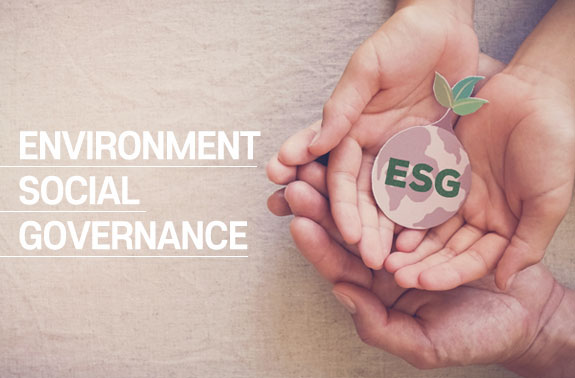Values Interlinking
to Transform the World
This year, major companies have made ESG the management keyword in their New Year’s addresses,
regardless of field of industry. Due to the promotion of mandatory ESG disclosure of companies listed on the KOSPI by 2030,
companies are required to disclose sustainability reports and corporate governance reports.
This means that the survival of a company is directly connected to ESG.
Let us look at the status of ESG, an essential strategy for global management.
regardless of field of industry. Due to the promotion of mandatory ESG disclosure of companies listed on the KOSPI by 2030,
companies are required to disclose sustainability reports and corporate governance reports.
This means that the survival of a company is directly connected to ESG.
Let us look at the status of ESG, an essential strategy for global management.

Why are companies leaping into ESG?
SNS is a daily routine, and boundaries between online and offline have become almost meaningless. And there is the MZ generation expressing various opinions through hashtags. And one hashtag keyword in particular has been frequently mentioned among them recently. The word #Yongginae. It may sound like a word of encouragement meaning “be courageous,” but it actually is a word for environmental practice of bringing your own container instead of using a disposable container.
Environmental organization Greenpeace and consumers participate in the “#Yongginae challenge” to positively influence many companies such as Coupang and Baemin on recycling of resources. And this led to the “Zero-waste campaign” to reduce disposable products. The changes in the awareness of consumers made the companies take a more active interest in their social responsibilities and protect the environment.
Environmental organization Greenpeace and consumers participate in the “#Yongginae challenge” to positively influence many companies such as Coupang and Baemin on recycling of resources. And this led to the “Zero-waste campaign” to reduce disposable products. The changes in the awareness of consumers made the companies take a more active interest in their social responsibilities and protect the environment.
The flow of information has become bidirectional to multi-directional, and the consumers are not passive anymore, showing their beliefs and values in purchases. Accordingly, the investors and investing organizations are also looking for businesses with high sustainability in non-financial factors, setting ESG data an important index for investment. For this reason, the companies have leaped into ESG management competitively. However, although they may be emphasizing ESG management, most of them are only starting. Therefore, to make transitions into a more developed ESG management system, we will take a look at some cases in each factor and the path to follow in the future.


Fundamentally, for the Environment
On the first day of his presidency, U.S. President Joe Biden signed up to the USA rejoining the Paris Climate Agreement. In addition, during the Leaders Summit on Climate on Earth Day, he has proposed a goal to cut America’s greenhouse gas emissions in half, from 2005 levels, by 2030. The summit had produced a message that the measures to combat climate change required not only the leading role of the USA, but also cooperation by other countries.
Following this trend, FedEx announced their commitment to carbon neutrality by 2040. They have also developed the 3Rs (Reduce, Replace, Revolutionize) that they announced a few years back and implemented on ESG management. They also operate the Fuel Sense program to reduce fuel consumption and invest in alternative fuels to reduce CO2 emissions. Currently, they are investing more than two billion dollars of initial capital on changing their transport vehicles to electric vehicles, supporting the establishment of a carbon capture center, developing alternative fuels, etc.
Coca-Cola Korea is also carrying out a fun campaign on the environment. The campaign that Coca-Cola Korea conducted last year is called the “OneThePl Campaign,” which stands for One-The(more)-Pl(astic), meaning using plastic one more time. When participants collect used plastic containers or PET bottles and request that they be picked up, they will be given merchandise items made of recycled products. Leftover plastics will be made into face shields and delivered to medical communities and small business owners. This will give the stakeholders, partner companies, and consumers an experience of a virtuous cycle of resource recirculation.
Companies now have to establish mid- to long-term environmentally friendly policies, including carbon-reduction policies, for the upcoming ESG management. Furthermore, they should present short-term performances and announce the results or evaluations every year. They would also have to reinforce the environmental investment in R&D areas. Consumers’ views on the enthusiasm of the companies responding to environmental problems have changed considerably.


Social Responsibility to Show Sincerity
A neologism “meaning out,” has appeared. It is a compound of “meaning” and “coming out,” referring to people expressing their tastes and social beliefs without hesitation. This shows the current consumption trend where consumers will gladly spend on the products of companies with a righteous life philosophy and ethical values.
The 'new-collar' workers, mentioned by Virginia Rometty, the CEO of IBM, are a new type of occupational class in the Fourth Industrial Revolution. Since learning that the proportion of female experts in science, engineering, and technology in India is about 14% lower than the international average, IBM has provided STEM education, a combination of science, technology, engineering, and mathematics, to girls in India who lack learning opportunities for the purpose of nurturing 'new collar' talent. And now, P-Tech, an unprecedented educational model co-developed by IBM and New York City, offers good educational opportunities not only for fostering 'new collar' talent, but also for students from developing countries and low-income groups.
IBM didn’t stop here and also launched the 'Be Equal' campaign. The campaign was launched to achieve gender equality, and continues to expand into activities to realize human rights and gender equality for employees, as well as diversity and inclusivity of races, etc. IBM also chose their partner companies based on whether they practice social ethics. This allowed them to form joint partnerships with the aim of social responsibility. These efforts eventually helped to increase the social ethical value of the brand.
In the past, companies were able to emphasize their positive image through social contribution and sharing activities conducted within or outside the company. However, in an era where SNS and daily life coexist, corporate value is determined by consumers' righteous and ethical consuming activities, and not just based on the management philosophy. It signifies that, in the era of low growth, companies without sincerity can no longer continue to grow. It should be remembered that internalized business ethics are now an essential part of management strategies.


Transparent, Honest, and Bold
The most difficult part of ESG management that can be converted to figures is governance. It is also the area that most falls behind among the standardized ESG indicators, which means that it is certainly not easy to change the structure of a company overnight. For this reason, the G sector has not yet taken hold in Korea, although the E and S sectors are being actively pursued.
On the other hand, global companies overseas emphasize the G sector as much as E and S. The World Economic Forum also considers G the most important element out of ESG. The difference between ESG and the existing CSR or sustainable management is that ESG includes the governance factor. Investment institutions also value companies whose corporate governance is transparent, as they are more likely to create new corporate values and maximize shareholder profits.
Apple's board of directors has a total of seven members, chaired by Arthur Levinson, former CEO of Calico, a Google subsidiary. It is amazing to have someone from a competitor company sit on the board of directors, not to mention as the chairman. However, Apple believed that when a professional manager becomes an outside director, he would be able to effectively check and supervise many aspects such as accounting books and decision-making, based on his experience. Besides Apple, U.S. companies are strengthening their governance by ensuring independence after appointing experts to their board of directors, regardless of their affiliation, such as asset managers or competitors’ former executives.
Some experts advise that in order for Korean companies to be more recognized as global companies, they must accept the new governance indicators and the direction of companies must be revised accordingly. For this to happen, the will of management is more important than anything else, and this is possible only when they understand the intent and purpose of ESG management and be able to communicate with anyone. By establishing ESG committees, companies must be willing to accept the role of checking and monitoring management, as well as leading them to better implement their environmental and social responsibilities.
Now is the time for companies to redesign their core management system into an ESG management system, establish new visions and values that can match the values of investors and consumers, and set up step-by-step strategies. As ESG indicators have not been fully scored and ranked in the global market yet, it is necessary to manage all standardized ESG indicators that reflect the characteristics of additional ESG indicators. Accordingly, it is necessary to realistically face the evaluation that the company is receiving continuously, and revise and supplement it accordingly.
Now that Covid-19 has swept across the world, there is infinite competition to open up possibilities in the uncertain future. And the global economy is facing a major paradigm shift called ESG. Companies are now at a crossroads whether they will be washed away by the raging waves of ESG, or continue sailing over the teeming waves.
2021.08.01

